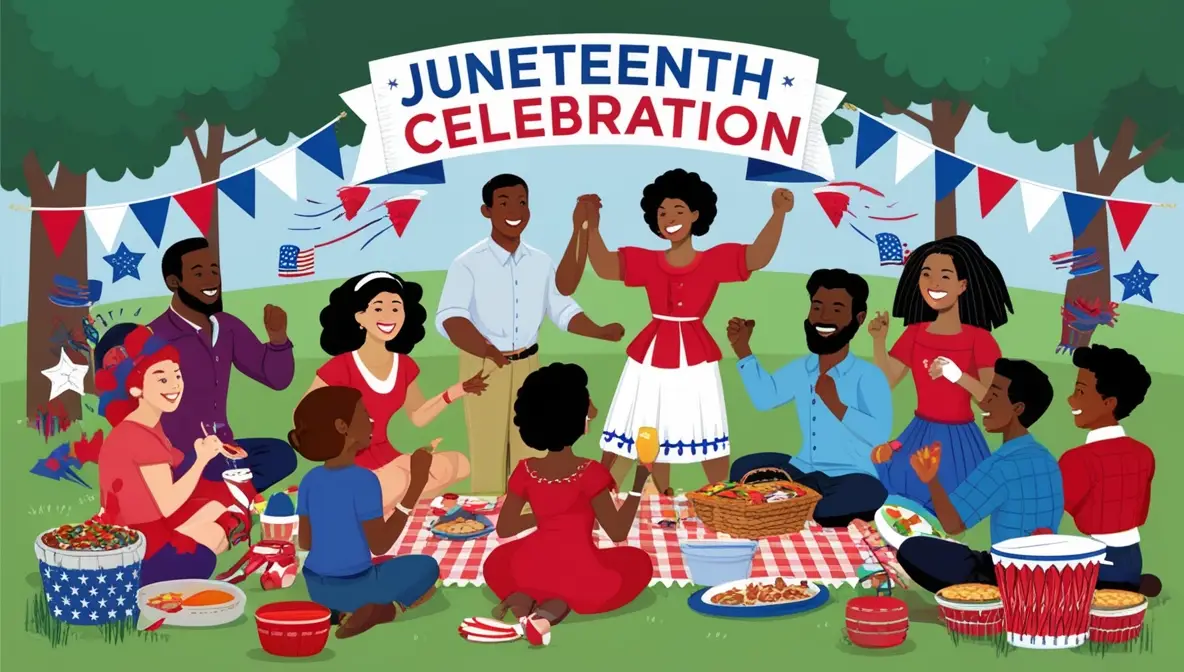Juneteenth: A Celebration of Freedom and the End of Slavery
Juneteenth, also known as Freedom Day or Emancipation Day, is a significant holiday that commemorates the end of slavery in the United States. It marks June 19, 1865, when Union soldiers arrived in Galveston, Texas, and announced that the Civil War had ended, and enslaved African Americans were now free. This announcement came over two years after the Emancipation Proclamation was issued by President Abraham Lincoln.
In this detailed article, we will explore the history of Juneteenth, its significance to African American culture, how it is celebrated, and its journey to becoming a federal holiday in the United States.

What is Juneteenth?
Juneteenth is the oldest nationally celebrated commemoration of the ending of slavery in the United States. It is derived from combining the words “June” and “nineteenth,” marking the day in 1865 when Union General Gordon Granger delivered the message of freedom to enslaved people in Texas, the last Confederate state to have enslaved people.
- Thursday, June 19 2025
- Friday, June 19 2026
- Saturday, June 19 2027
- Monday, June 19 2028
The History Behind Juneteenth
The story of Juneteenth begins with the Emancipation Proclamation, which President Abraham Lincoln signed into law on January 1, 1863. While the proclamation declared all slaves in Confederate states to be free, it had little immediate effect in areas still under Confederate control. Texas, being geographically remote and largely untouched by Union troops, became the final holdout.
On June 19, 1865, Union General Granger and his troops arrived in Galveston to enforce the proclamation, formally freeing the enslaved population in Texas.
The Emancipation Proclamation and Its Impact
The Emancipation Proclamation was a key milestone in the fight to end slavery, but its immediate impact was limited. It only applied to states that were in rebellion against the Union, and not to border states or rebel areas already under Union control. Its enforcement relied heavily on Union military victories.
Although it laid the groundwork for the eventual abolition of slavery, true freedom came for many enslaved individuals only when Union troops arrived to enforce the law. Juneteenth stands as the symbolic day when freedom was finally realized by all African Americans.
Why Did It Take So Long for Texas to Hear the News?
Texas, due to its isolation and lack of Union presence during much of the Civil War, did not immediately feel the effects of the Emancipation Proclamation. Additionally, many slaveholders deliberately withheld the information to maintain control over the enslaved population for as long as possible. The arrival of Union troops in June 1865 marked the end of this era of oppression.
Celebrating Juneteenth: Traditions and Customs
Juneteenth celebrations began in Texas in 1866, and they have continued to grow and evolve over the years. The day is often marked with gatherings of family and friends, community picnics, parades, prayer services, and cultural performances. The holiday serves as a reminder of resilience, freedom, and the ongoing struggle for equality.
Traditional Juneteenth Activities:
- Reading of the Emancipation Proclamation
- Barbecues and picnics
- Family reunions
- Historical reenactments
- Parades and marches
- Music, dance, and poetry performances
Juneteenth Symbols and Colors
The colors red, white, and blue are often used to symbolize Juneteenth, reflecting the American flag and the fight for freedom in the United States. Red, in particular, has significant cultural meaning as it represents the bloodshed and sacrifices made by those who fought for freedom.
The Juneteenth flag, designed in 1997, includes these colors along with a starburst in the center, symbolizing new beginnings for African Americans.
Juneteenth in the 21st Century
In recent years, Juneteenth has experienced a resurgence in popularity, with more people learning about its significance and more cities and states recognizing it as a holiday. This renewed interest has been fueled in part by the ongoing fight for racial justice and equality in the United States.
The 2020 protests against police brutality and systemic racism, in particular, highlighted the importance of acknowledging and celebrating Juneteenth as a symbol of African American resilience and the ongoing pursuit of freedom.
How Different States Celebrate Juneteenth
While Texas was the first state to make Juneteenth a state holiday in 1980, other states have since followed suit. The celebrations vary from state to state, with some hosting parades, festivals, and community events, while others hold educational workshops and panel discussions.
In cities like Houston and Dallas, Juneteenth celebrations have become major events, drawing large crowds and featuring musical performances, food vendors, and educational activities.
The Journey to Juneteenth Becoming a Federal Holiday
After decades of advocacy, Juneteenth was finally recognized as a federal holiday in the United States on June 17, 2021. This was a significant milestone in the recognition of African American history and the legacy of slavery in the country. The establishment of Juneteenth as a national holiday was seen as a long-overdue acknowledgment of the struggles and contributions of African Americans.
Juneteenth and the Civil Rights Movement
While Juneteenth originated as a celebration of emancipation, it has also become a symbol of the broader struggle for civil rights and social justice. During the Civil Rights Movement of the 1960s, Juneteenth became a rallying point for African Americans advocating for equality, voting rights, and an end to racial segregation.
Juneteenth in Popular Culture
Juneteenth has increasingly become a subject of popular culture, with references in literature, film, and music. Notable mentions include Ralph Ellison’s novel “Juneteenth” and the 2020 film “Miss Juneteenth,” which explores the intersection of the holiday with African American beauty pageants and culture.
Musicians and artists have also paid tribute to the holiday through songs, performances, and visual art that celebrate freedom and highlight the ongoing fight for equality.
Why Juneteenth Matters Today
In today’s society, Juneteenth serves as a powerful reminder of the progress that has been made and the challenges that remain. As the nation continues to grapple with issues of systemic racism, police brutality, and inequality, Juneteenth provides an opportunity to reflect on the past and renew the commitment to building a more just and equitable future.
How to Support and Honor Juneteenth
There are many ways individuals and communities can honor Juneteenth. Here are a few suggestions:
- Educate Yourself: Learn more about the history of Juneteenth and its significance.
- Attend or Organize Events: Participate in local Juneteenth events, parades, or workshops.
- Support Black-Owned Businesses: Use the holiday as an opportunity to support businesses that contribute to the economic empowerment of African Americans.
- Advocate for Racial Justice: Engage in activism and advocacy efforts to address systemic racism and inequality.
- Reflect and Celebrate: Take time to reflect on the meaning of Juneteenth and celebrate freedom with family and friends.
Educating Future Generations About Juneteenth
It is crucial to educate younger generations about the significance of Juneteenth and the history of African Americans in the United States. Schools, communities, and families can play a vital role in passing on the legacy of Juneteenth by incorporating it into educational programs, cultural events, and conversations about freedom and equality.
Juneteenth stands as a poignant reminder of the long and arduous road to freedom for African Americans. It celebrates not only the end of slavery but also the resilience and strength of a people who have fought for their rights and dignity. As Juneteenth continues to grow in recognition, it serves as an opportunity for all Americans to reflect on the nation’s history and look toward a future where freedom and equality are truly for all.
FAQs
1. Why is Juneteenth important?
Juneteenth marks the end of slavery in the U.S. and celebrates African American freedom and resilience.
2. How is Juneteenth celebrated?
Juneteenth is celebrated with parades, picnics, music, and cultural events. Many also take part in educational activities.
3. When did Juneteenth become a federal holiday?
Juneteenth became a federal holiday on June 17, 2021.
4. What is the significance of the Juneteenth flag?
The Juneteenth flag represents freedom and a new beginning for African Americans, featuring red, white, and blue colors and a starburst.


